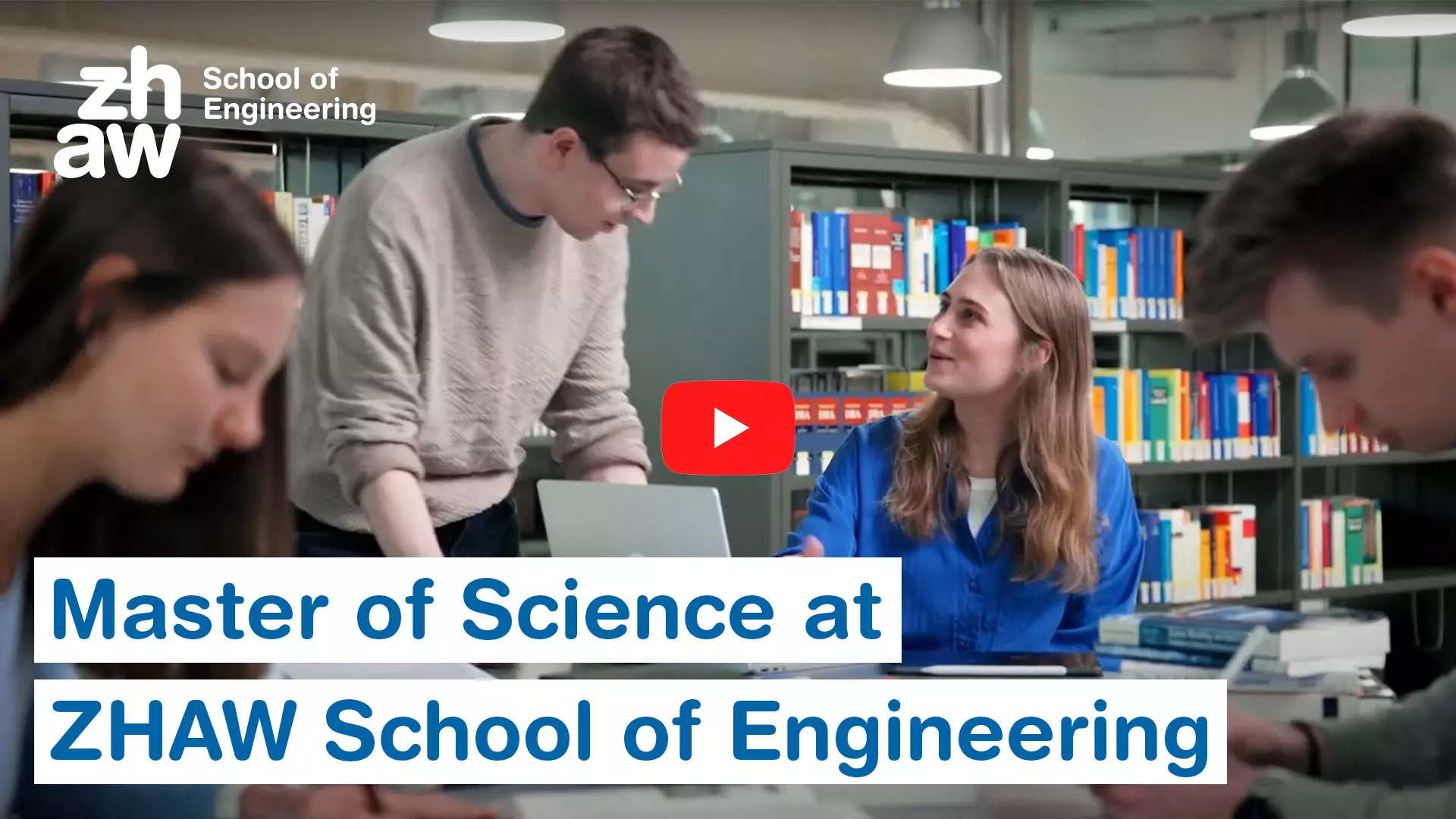Master of Science in Engineering

«I was enthusiastic about the Master's program at ZHAW. It was much less rigidly structured compared to the Bachelor's program and offered more flexibility in choosing courses.»
Fabiano Ulmke, Graduate with an MSE in Business Engineering
For the graduate profile, click here
Why choose to pursue a Master’s degree?
The best Bachelor students who have completed a Bachelor's degree with an A or B grade have the opportunity to pursue a Master of Science in Engineering (MSE). The Master's degree is the highest academic university degree. It opens up considerable career prospects and represents a continuation of your academic career.
You will focus on a specialisation at one of our institutes or centres, where you will work on projects and complete your Master’s thesis. The Master’s programme can be combined with a stay abroad, during which you may choose to write your Master’s thesis at a partner university, for example.
The ZHAW School of Engineering offers a Master’s programme in the areas of Aviation, Business Engineering, Civil Engineering, Computer Science, Data Science, Electrical Engineering, Energy and Environment, Information and Cyber Security, Mechanical Engineering, Mechatronics and Automation, Medical Engineering and Photonics and Laser Engineering. The courses will be held in english.


At a glance
Completion: Master of Science in Engineering with Specialisation in (profile) UAS Zurich
Application: Application
Time expenditure: 90 ECTS-Credits
Course duration: Three semesters (full-time) / six semesters (part-time)
Admission criteria: Bachelor's degree (A or B grades), admission interview
Start: Choice of autumn or spring semester
Application deadlines: End of October and end of April (or as agreed)
Course location: Zurich (theory modules) and Winterthur (specialised modules)
Language of instruction: English
Costs: CHF 720 per Semester + additional study costs
Profiles: Aviation, Business Engineering, Civil Engineering, Computer Science, Data Science, Electrical Engineering, Energy and Environment, Information and Cyber Security, Mechanical Engineering, Mechatronics and Automation, Medical Engineering, Photonics and Laser Engineering
Curriculum design: Curriculum structure, theory modules, in-depth specialisation, Master's thesis
Profiles in MSE
ZHAW School of Engineering offers the following twelve profiles: Aviation, Business Engineering, Civil Engineering, Computer Science, Data Science, Electrical Engineering, Energy and Environment, Information and Cyber Security, Mechanical Engineering, Mechatronics and Automation, Medical Engineering, Photonics and Laser Engineering
When choosing a profile, you specify a particular focus and determine your general direction of specialisation without having to focus strongly. The profile appears after successful graduation with the title "Master of Science in Engineering ZHAW in (name of profile)".
Overview profiles in MSE
Collaboration with industry partners
The institutes and centres of the School of Engineering engage in research and development projects together with industry and business partners. You will benefit directly from this. In the specialisation work and Master’s thesis, you will work on your own topics in close collaboration with industrial companies and service providers.
Studies abroad and double degree
The master’s degree programme can be combined with a period of study abroad. This can also involve students writing their master’s degree thesis abroad (information for Incoming exchange students).

"The year overseas was a very good personal experience for me. I learned to adapt to a new environment and to flexibly address new challenges each day."
Dominic Thaler, graduate of the Double Degree programme and Structures Design Engineer at Aurora Swiss Aerospace
Click here to view graduate profile
Full- and Part-time studies
The master’s degree can be completed both as a full-time course lasting three semesters and as a part-time course lasting four to six semesters. As a part-time student, you can be employed by any employer of your choice. The combination of part-time studies and employment as a scientific assistant at one of our institutes or centers is also popular.
Annual schedule
The study programme is geared to the academic calendar, with some adjustment possible due to individual project situations. By contrast, the teaching times and examination sessions are fixed. It is possible to start your studies in either the spring or autumn semester.
Information events and application
Information events
- August 15, 2024, from 6:00-7:30 PM (Online)
- September 18, 2024, from 6:00-7:30 PM (Online)
- October 15, 2024, from 6:00-7:30 PM (Online)
Study Application
Registrations for the autumn semester (starting in September) are possible from the beginning of February until the end of April. For the spring semester of the next year (starting in February) from the beginning of August until the end of October.
Brochure
Additional information
Information for MSE students
Information for students of the Master of Science in Engineering at the ZHAW School of Engineering.
All set for starting your MSE
All the important information and dates you need to know relating to the start of your studies.
MSE tool
Information for MSE students
All set for starting your MSE
An individualised timetable can be designed using the MSE Tool.
Information for students of the Master of Science in Engineering at the ZHAW School of Engineering.
All the important information and dates you need to know relating to the start of your studies.




